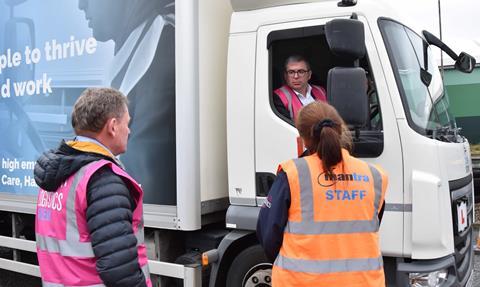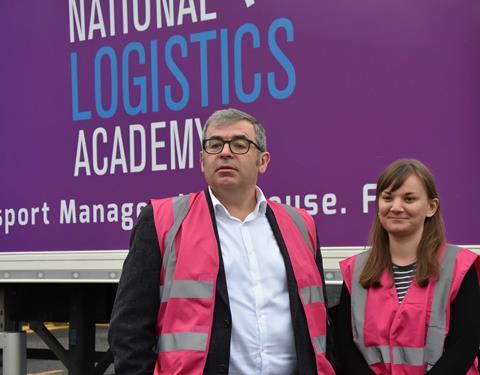
Phil Martin, head of HGV workforce strategy, and Alex Green, team leader for freight and logistics workforce and skills policy at the DfT, attended The National Logistics Academy Partners Conference held in Manchester on 5 December in order to consult with specialist training providers on the skills training needs of the road haulage industry. The new government is keen to understand the strengths and weaknesses of current programmes such as Skills Bootcamps and apprenticeships and explore what an ideal-world future training mix might look like.
The bi-annual conference brought together all the Academy’s training provider partners who deliver HGV training across the country – most of which are also members of the Logistics Skills Network – who’s members collectively deliver 70% of all HGV training across the UK.
It provided an excellent opportunity for the DfT to see and hear firsthand what it is like to be a provider in the logistics training space and to explore how government-funded programmes are impacting on the ongoing driver shortage.

Martin and Green stated that “they want to be well informed on all matters relating to the freight and logistics sector so that they can be well placed to inform Whitehall colleagues on the development of the Growth and Skills Levy and the contribution of the logistics sector to the wider growth strategy”.
This work is supported by the People and Skills Delivery Group for Freight established by the DfT in February 2024 involving the various industry membership associations including the Logistics Skills Network.
In particular the DfT wanted to understand from the providers:
• What might an effective and realistic Growth and Skills Levy look like?
• What foundation training courses are needed to develop basic skills and support entry into the sector and act as a stepping stone to a career?
• Are there any training needs that haven’t been possible to fill due to existing systems?
• Are there existing training offerings (i.e. apprenticeships) that could be delivered in a shorter duration than they currently are?
• To what extent do employers and providers have a clear picture of the future skills needed in the sector, how does existing training need to be adapted to meet those needs?
• What action does government need to take in relation to the above and how can government best work with the sector on these matters?
Mark Currie, CEO of the National Logistics Academy (NLA) and director of the Logistics Skills Network, chaired the responses from the floor and reminded the DfT that employer and participant demand for HGV Skills Bootcamps remains strong and continues to play a vital role in tackling the continuing HGV driver shortage and keeping Britain moving.
Currie stated that the UK has seen a significant decline in LGV Driver apprenticeship starts from a peak of 2,830 in 2021/22 to just 870 in 2023/24 whilst demand for Skills Bootcamps has surpassed all expectations and is delivering around 13% of all new drivers. This year the NLA has qualified 1,592 new drivers through Skills Bootcamps and 100% of these have secured employment.
The RHA recently estimated that 40,000 new drivers are needed each year to replace drivers retiring from or leaving the profession, requiring 70,000 tests.
Currie said that the key ask of the government is to avoid any gaps between the current funded Skills Bootcamps programmes and the roll out of any new training programmes they may develop. Government needs to ensure that delivery volumes are maintained to avoid exacerbating the driver shortage and to retain the capacity of the providers to be able to deliver in the future. Existing Skills Bootcamps contracts could continue until a suitable replacement is ready. In addition, he would welcome a shorter six to nine-month HGV apprenticeship.
Both Martin and Green had an opportunity to drive rigid and articulated vehicles on the NLA manoeuvring site and they both showed a lot of potential with Martin performing the reversing exercise right first time.
David Coombes, MD, Logistics Skills Network














